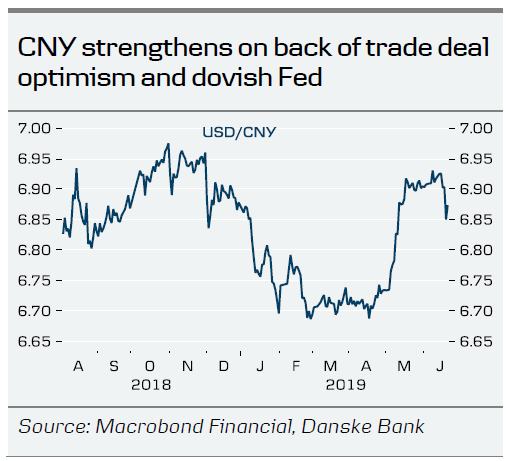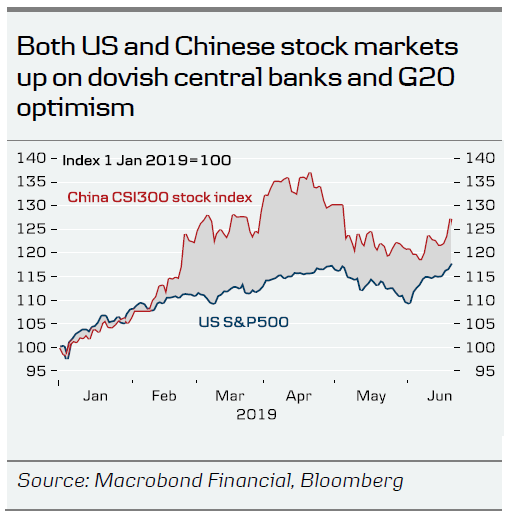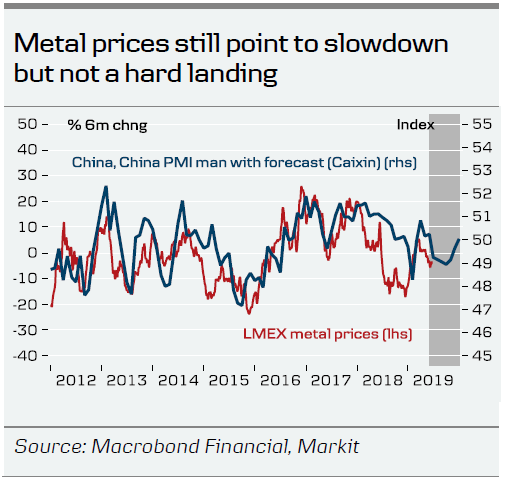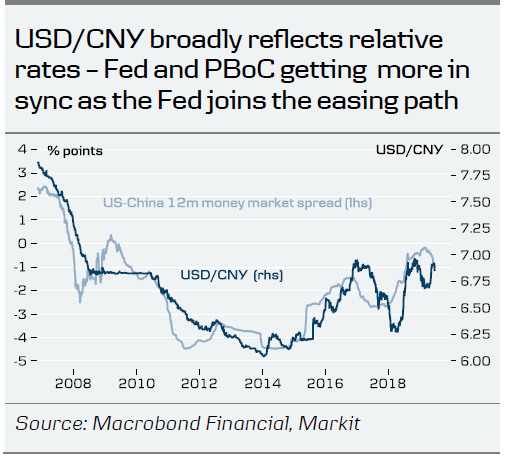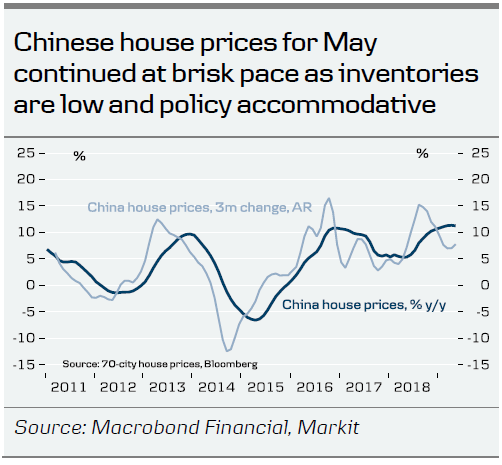- Xi-Trump phone conversation raises the probability of a trade war ceasefire at the G20 meeting. We now see slightly more than 50% chance of this happening.
- US tech companies warn their competitiveness will be hurt by higher tariffs. Huawei puts price tag on US export ban: USD30bn.
- CNY and equity markets get a lift from trade hopes and dovish Fed.
Trump makes a small blink with phone call to Xi
The coming week will reveal if we will have another ceasefire in the trade war and a resumption of trade talks – or if we are heading towards renewed escalation. This week US President Donald Trump and his Chinese counterpart Xi Jinping talked on the phone and agreed to meet in Osaka next week on the sidelines of the G20 Summit. The meeting has been expected for some time but China had not officially confirmed it would take place.
Trump broke the news in a tweet saying he had a ‘very good telephone conversation with President Xi of China. We will be having an extended meeting next week at the G-20 in Japan’. According to SCMP Trump initiated the phone call. Chinese news media Xinhua confirmed the call and quoted Xi as saying that ‘the two sides should…push forward the China-U.S. relationship featuring coordination, cooperation and stability on the basis of mutual respect and mutual benefit’. He also stressed that ‘China hopes the US can treat Chinese firms in a fair manner’ in a clear reference to the US export ban on Huawei.
On Thursday China said it hoped the US would bring a problem-solving attitude to the trade talks in Japan and repeated three points where China cannot compromise : 1) complete roll-back of US tariffs to where they were before the trade war, 2) the scale of goods purchases from US by China and 3) the need for a balanced text.
Lighthizer this week said in a hearing that he believed Chinese negotiators had gone beyond their mandate in the trade negotiations, which was the reason why they had backtracked on certain issues. He added that ‘my hope is we can get back on track’. In a further sign that Trump would like to get the talks started again, there were reports of debate inside the White House on whether a speech by US Vice President Mike Pence next week should exclude sanctions on Chinese officials related to the Xinjiang internment camps. The US Treasury Secretary Stephen Mnuchin has supposedly warned on this as it could obstruct a restart of trade talks.
Comment. We see Trump’s phone call to Xi as a small blink in the trade war . It reveals that he is keen on meeting with Xi at the G20, which China had not confirmed before the call. We now see a higher than 50% probability that the meeting will end with a ceasefire and resumption of trade talks. The negotiations will still be difficult, though, as we believe China will stand firm on the three ‘red lines’ they have highlighted. Xi may also condition new talks on a withdrawal of the export ban on Huawei, which is a sharp attack on Chinese technology and seen as an attempt to contain China. If Trump fails to withdraw the export ban, China could retaliate through its ‘unreliable foreign entities’ list.
Our baseline scenario is still that a deal is reached during H2 and that Trump will eventually accept China’s ‘red lines’. We believe Trump will gain more from a deal in his attempt for re-election as President than by continuing a trade war that could become costly for the economy and make him unpopular with farm voters in important swing states.
US tech warns Trump of higher tariffs
The hearing period for tariffs on another USD300bn of Chinese goods started this week. Most noteworthy have been clear warnings by Apple and other tech companies that tariffs would be costly and put US tech companies at a disadvantage to foreign competitors. Apple said in a letter to the US Trade Representative that tariffs would ‘result in a reduction of Apple’s U.S. economic contribution’ and that ‘U.S. tariffs would also weigh on Apple’s global competitiveness’. Tech companies Dell, HP, Intel and Microsoft wrote in a joint letter ‘the tariffs will harm US technology leaders, hindering their ability to innovate and compete in a global marketplace’.
Huawei founder Ren Zhengfei this week said he had not expected a US attack ‘with such determination and on such a large scale’. He also put a price tag on the cost saying the blacklisting of the company was expected to wipe out USD30bn of revenues. Huawei earlier this month said it had put its launch of a laptop on hold indefinitely.
Comment. The warning from tech companies will likely make an impression on Trump and at least make it clear that any tariff increase should only be temporary. Otherwise it will hurt US ambitions to stay as the world’s tech leader. Trump spoke personally with Apple CEO Tim Cook last week, where Cook most likely expressed concern over a potential consumer boycott as well. The attack on Huawei is very severe and costly for China’s most significant tech company. We expect Xi to ask Trump to remove the blacklisting of Huawei at the G20 meeting. Otherwise, China is likely to retaliate and could for example restrict rare earth exports to the US.
CNY and equities get lift from trade hopes and dovish Fed
The USD/CNY declined this week following a dovish statement by the Federal Reserve that paves the way for rate cuts in coming months. The cross fell from 6.91 to below 6.87, the lowest level in a month. More optimism for a trade deal also supported CNY. The news on the Fed and the trade front also fuelled a rally in equities.
Comment. Our forecast is still for a higher USD/CNY to 7.10 before it heads lower again once a trade deal is signed. However, if a ceasefire paves the way for a deal sooner than expected, then we may have seen the peak in USD/CNY already. We are still cautious on Chinese equities as the macro outlook is fragile and the road to a trade deal could be rocky.
Other China news over the past week:
- Negotiations between China and Europe on reciprocal investment access went better than expected in a sign that China’s worsening relation with the US could benefit Europe.
- China house prices rose11.6% y/y in May. Housing cushions the current downturn.
- Xi visits North Korea in first state visit in 14 years as relations strengthen.
- Hong Kong leader pulls back extradition bill and makes public apology.

